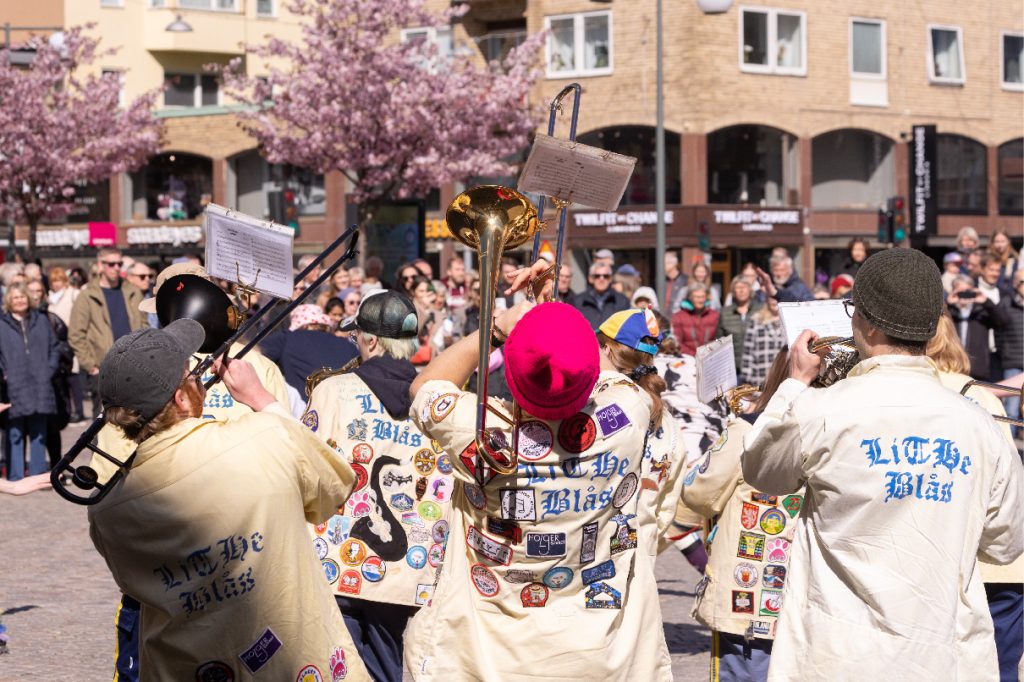The student’s dictionary
Kravall, ovve, tenta and dugga – Do you also feel completely lost in the swedish student slang? Don’t worry, now we’ll go through the words you might need in your studies – or if someone around you starts talking about words you don’t understand.
-
Nolle-P & Nollan
The new students are all referred to as ‘nollan’ (singular) or ‘nollan’ (plural) during the reception period. This is because the new student still has zero academic credits, so it’s not meant to be derogatory. The reception period at the beginning of the academic year, which takes place in mid-August for the fall semester and mid-January for the spring semester, is called ‘Nolle-P’ (nolle period) for the students.
-
Tenta, Omtenta och Dugga
A “tenta” is a larger test or assessment often conducted at the end of a course. If you don’t pass the exam, you may be allowed to take a reexamination “omtenta”. A “dugga” is a smaller quiz or test conducted before the exam, serving as a tool for the student to gauge their understanding of the subject or various components. Since exams usually occur around the same time for all students, the weeks leading up to exams are commonly referred to as ‘tenta-p’ (exam period), and many students study almost continuously.
-
Ovve
Ovve is a shortening of the word ‘overall.’ The garment ‘ovve’ is sacred to students and is often worn during parties, the reception period, and other occasions. The color of the overall and its stripes is determined by the program of study. The overall is also often adorned with fabric patches representing associations, attended events, or amusing trivia.
-
Kravall, Sittning and Gyckel
Students often organize various types of events, with the most student-oriented being “Kravall” and “Sittning”. Kravall is a party where students wear overalls, and the term ‘kravall’ stands for a demand for overalls. A ‘sittning’ is a dinner with many guests, featuring food and entertainment in the form of revelry (also known as ‘gyckel’), often consisting of songs or other forms of entertainment.

-
Campus
Areas where students have their academic and social settings all in one place. Here, students can have everything from exams to parties. For LiU (Linköping University) students in Linköping, there are campuses in Valla and at the University Hospital.
-
Fadderi, Festeri and mästeri
There are several different associations that organize various events during the study period. A ‘Fadderi’ is an association that plans and carries out the reception period (‘Nolle-P’) for new students. They are typically a bit oddly dressed during Nolle-P, walk in groups, and speak in a unique way. They may look a bit intimidating, but there’s nothing to be afraid of. A ‘Festeri’ is an association that hosts parties, kravall’s, and banquets throughout the year, as well as other events such as competitions. A ‘Mästeri’ is a group that combines aspects of both a ‘Fadderi’ and a ‘Festeri,’ engaging in both activities
-
Student union, faculties and Student union houses
A student union (kår) is an interest organization working to ensure students have a good academic experience, akin to a student’s trade union. At LiU, there are three student unions, each representing different faculties or academic areas: the Technical Student Union (TekFak), the Philosophical Student Union (Filfak), and the Medical Student Union (Medfak). Students who choose to join and pay a membership fee to the union receive support if there’s anything they feel they need help with during their education or in a study-related context. The unions collectively own union houses (kårhus) located throughout Linköping. It is in these houses that students organize parties, pubs, kravalls, and banquets.
-
The academic quarter
Keep an extra eye on the times in the schedule! Often, a lecture for students may start fifteen minutes later than what might feel ‘normal.’ For occasions like group work or smaller sessions that are set to start at ’10,’ many may roll in closer to 10:15, as the academic quarter is a common practice for many participants. However, if it says, for example, ‘8:00,’ then 8:00 is the actual starting time. This is known as the academic quarter and is said to have its origins from a time when it was uncommon for students to carry watches and relied on the church’s chimes
-
Stad i Ljus
Tommy Körberg’s Stad i ljus serves as the students’ anthem, concluding all the parties. Have you not seen the clip from Musikhjälpen on Stora Torget in 2015, where the students sing together with Rickard Söderberg? Absolutely magical! We recommend that you check out down below. Can you recognize some of the overalls?